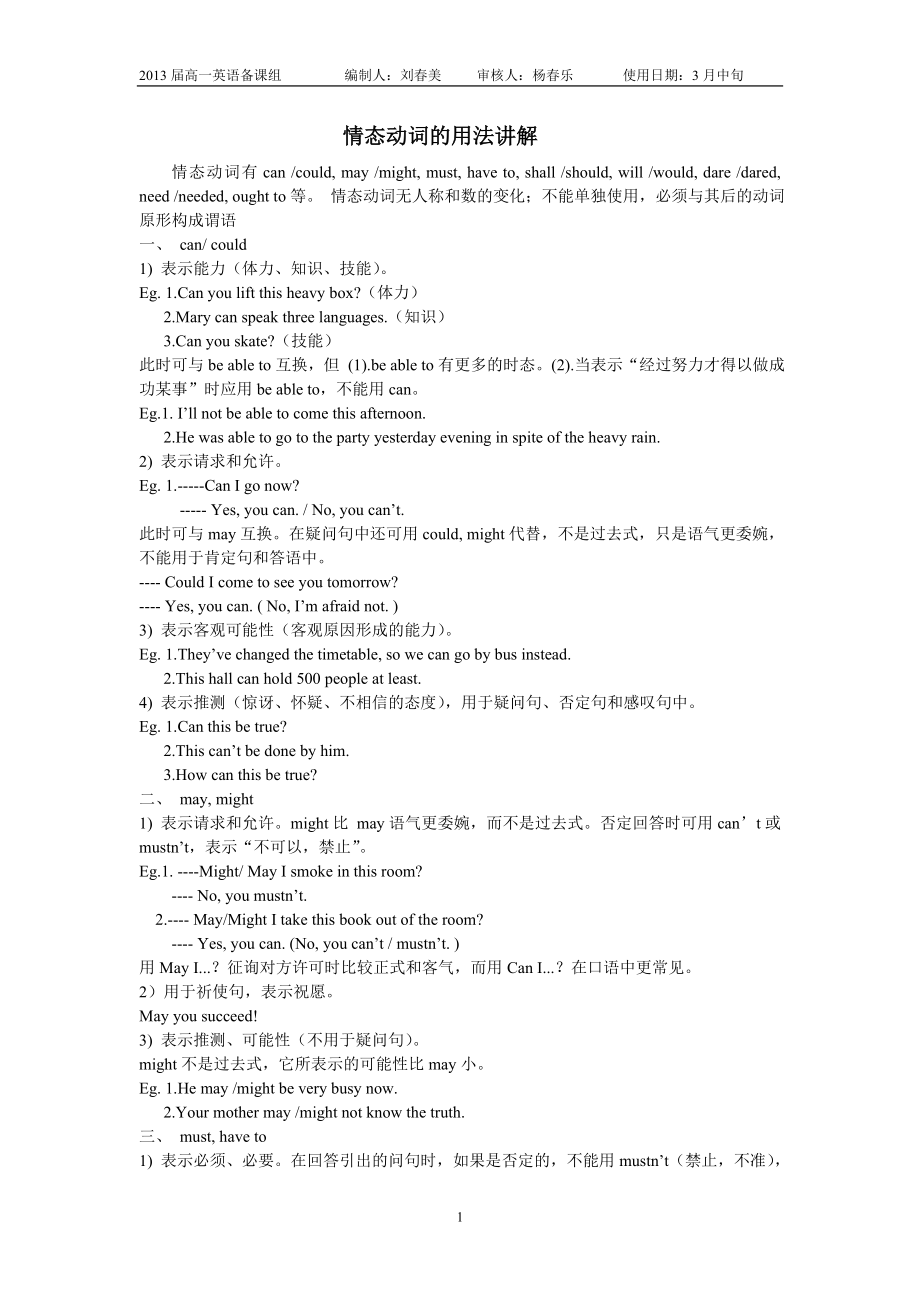 情态动词MicrosoftWord文档
情态动词MicrosoftWord文档



《情态动词MicrosoftWord文档》由会员分享,可在线阅读,更多相关《情态动词MicrosoftWord文档(4页珍藏版)》请在装配图网上搜索。
1、2013届高一英语备课组 编制人:刘春美 审核人:杨春乐 使用日期:3月中旬情态动词的用法讲解情态动词有can /could, may /might, must, have to, shall /should, will /would, dare /dared, need /needed, ought to等。 情态动词无人称和数的变化;不能单独使用,必须与其后的动词原形构成谓语一、 can/ could1) 表示能力(体力、知识、技能)。Eg. 1.Can you lift this heavy box?(体力)2.Mary can speak three languages.(知识)3.C
2、an you skate?(技能)此时可与be able to互换,但 (1).be able to有更多的时态。(2).当表示“经过努力才得以做成功某事”时应用be able to,不能用can。Eg.1. Ill not be able to come this afternoon.2.He was able to go to the party yesterday evening in spite of the heavy rain.2) 表示请求和允许。Eg. 1.-Can I go now? - Yes, you can. / No, you cant. 此时可与may互换。在疑问句
3、中还可用could, might代替,不是过去式,只是语气更委婉,不能用于肯定句和答语中。- Could I come to see you tomorrow? - Yes, you can. ( No, Im afraid not. )3) 表示客观可能性(客观原因形成的能力)。Eg. 1.Theyve changed the timetable, so we can go by bus instead.2.This hall can hold 500 people at least.4) 表示推测(惊讶、怀疑、不相信的态度),用于疑问句、否定句和感叹句中。Eg. 1.Can this be
4、 true?2.This cant be done by him.3.How can this be true?二、 may, might1) 表示请求和允许。might比 may语气更委婉,而不是过去式。否定回答时可用cant或mustnt,表示“不可以,禁止”。Eg.1. -Might/ May I smoke in this room? - No, you mustnt.2.- May/Might I take this book out of the room?- Yes, you can. (No, you cant / mustnt. )用May I.?征询对方许可时比较正式和客气
5、,而用Can I.?在口语中更常见。2)用于祈使句,表示祝愿。May you succeed!3) 表示推测、可能性(不用于疑问句)。might不是过去式,它所表示的可能性比may小。Eg. 1.He may /might be very busy now.2.Your mother may /might not know the truth.三、 must, have to1) 表示必须、必要。在回答引出的问句时,如果是否定的,不能用mustnt(禁止,不准),而用neednt, dont have to(不必).Eg.- Must we hand in our exercise books
6、 today?- Yes, you must.- No, you dont have to / you neednt.2) must是说话人的主观看法, 而have to则强调客观需要。must只有一般现在时, have to 有更多的时态形式。Eg. 1.The play isnt interesting,and I really must go now.2.I had to work when I was your age.3) 表示推测、可能性(只用于肯定的陈述句)Eg. 1.Youre Toms good friend, so you must know what he likes b
7、est.2.Your mother must be waiting for you now.4). 表示 “一定要;偏要”Eg. 1.Must you worry her with questions, just when she is busy cooking dinner?2.Must you make so much noise?即时练习:1.那小女孩没有出门。她现在一定在做家庭作业。 The girl is not out. She _her homework now.2. 路上是湿的。昨晚一定下雨了。 The road is wet. It _ last night.3. 我刚刚拜访
8、过他。他现在一定呆在家里。 I have just dropped in on him. He _at home.4. 你为什么没有接电话? 我当时一定是在睡觉所以没听见。Why didnt you answer my phone call? Well, I _, so I didnt hear it. 5. 那男孩想必已经完成了他的家庭作业了。 The boy_ his homework.四、 dare, need1) dare作情态动词用时, 常用于疑问句、否定句和条件从句中, 过去式为dared。Eg. 1.How dare you say Im unfair?2. He darent
9、speak English before such a crowd, dare he?3. If we dared not go there that day, we couldnt get the beautiful flowers.2) need 作情态动词用时, 常用于疑问句、否定句。Eg. 1You neednt come so early.2. - Need I finish the work today?- Yes, you must. / No, you neednt.3) dare和 need作实义动词用时, 有人称、时态和数的变化。在肯定句中,dare后面常接带to的不定式。
10、在疑问句和否定句中,dare后面可接带to或不带to的不定式。而need后面只能接带to的不定式。Eg. 1. I dare to swim across this river.2. He doesnt dare (to) answer.3. He needs to finish his homework today.即时练习:How dare you say such a thing? How dare you to say such a thing? He darent to speak English before such a crowd, did he? He darent spea
11、k English before such a crowd, dare he? Nobody need to be afraid of catching the disease. Nobody need be afraid of catching the disease. These dishes needed be cleaned carefully. These dishes need to be cleaned carefully. These dishes need cleaning carefully 五、 shall, shouldShall的用法1) shall 用于第一,三人称
12、的疑问句,征求对方的意见或提出建议。Eg. 1.What shall we do this evening? 2.Shall I turn on the lights?3.Shall he wait for you outside?2) shall 用于第二、三人称,表示说话人给对方的命令、警告、允诺或威胁。Eg. 1. You shall fail if you dont work hard.(警告)2. He shall have the book when I finish it.(允诺)3. He shall be punished.(威胁)3) shall 表示强制,用于法令、条约、
13、规章中,意为“必须,应该”。如:Eg. Candidates shall remain in their seats until all the papers have been collected.即时练习:1. Will Mr Wang offer us a hand? He _ _ be glad to. He never refused our request. A. can B. must C. may D. should 2.“The interest _ be divided into five parts, according to the agreement made by
14、both sides.” declared the judge.A. may B. should C. must D. shall3. When can I come for the photos? I need them tomorrow afternoon. They _ _ be ready by 12:00. A. can B. should C. might D. need4.Its nearly seven oclock. Jack _ _ be here at any moment. A. must B. need C. should D. can六、 will, would1)
15、 表示请求、建议等,would更委婉。Will / Would you pass me the ball, please?2) 表示意志、愿望和决心。1. I will never do that again.2. They asked him if he would go abroad.3).will表示现在的习惯,would表示过去的习惯。would表示过去习惯时比used to正式,且没有“现已无此习惯”的含义。Eg. 1.When he was a child, he would often go skiing. 2.This old man is strange . He will
16、sit for hours without saying anything.4).表示意愿 Eg.1.She wont lend me the money . 2.This window wont open.5).will表示某些根据自然规律必定会发生的事情,物体固有的性质,倾向 Oil will float on water .七、 should, ought to1) should, ought to表示“应该”,ought to表示义务或责任,比should语气重。Eg. 1. I should help her because she is in trouble.2. You ough
17、t to take care of the baby.2) 表示劝告、建议和命令。Eg. 1. You should / ought to go to class right away.3) should表推测,语气比较肯定,往往具有一定的客观根据,常译为“理该”When can I come for the photos? I need them tomorrow afternoon.They should be ready by 12:00. 4) 表示“万一”If it should rain tomorrow, dont expect me. 5)表示“竟然”Its strange t
18、hat he should be late. 八、 情态动词+ have done1) can / could + have done 有两层含义:1.在肯定句中表示“过去本来可以做而实际上未做某事”,是虚拟语气 2.在疑问句或否定句中表示对过去行为的怀疑或不肯定, 表示推测。Eg. 1. You could have done better, but you didnt try your best. (虚拟语气)2. He cant have been to that town.(推测)3. Can he have got the book?(推测)2) may / might + have
19、 done 1.表示对过去行为的推测。2.用于虚拟语气中Eg.1. He may not have finished the work .2. If we had taken the other road, we might have arrived earlier.3)must + have done用于肯定句中,表示对过去行为的推测。意为“一定、想必”。其疑问、否定形式用can,cant代替。Eg. 1. You must have seen the film Titanic.2. He must have been to Shanghai.4)should/ought to + have
20、 done表示“过去本应该做而实际上没有做某事”,其否定式表示某种行为过去本不该发生却发生了。Eg. 1. You ought to / should have helped him. (but you didnt.)2. She shouldnt have taken away my measuring tape, for I wanted to use it.5) neednt + have done表示“过去本来不必做而实际上做了某事”。Eg. You neednt have watered the flowers, for it is going to rain.即时练习:1.I _(
21、buy)so much wineonly five people came. 2.Tom, you are too lazy. The work_(finish) yesterday. 3. She_(achieve) greater progress, if you had given her more chances. 4.There is nowhere to find them. Where _they _(go)? 5. It_(rain) last night, for the ground is wet. 6.He _(pass) the exam, but he was too careless. 7.Mary _( not steal) your money. She has gone home.4
- 温馨提示:
1: 本站所有资源如无特殊说明,都需要本地电脑安装OFFICE2007和PDF阅读器。图纸软件为CAD,CAXA,PROE,UG,SolidWorks等.压缩文件请下载最新的WinRAR软件解压。
2: 本站的文档不包含任何第三方提供的附件图纸等,如果需要附件,请联系上传者。文件的所有权益归上传用户所有。
3.本站RAR压缩包中若带图纸,网页内容里面会有图纸预览,若没有图纸预览就没有图纸。
4. 未经权益所有人同意不得将文件中的内容挪作商业或盈利用途。
5. 装配图网仅提供信息存储空间,仅对用户上传内容的表现方式做保护处理,对用户上传分享的文档内容本身不做任何修改或编辑,并不能对任何下载内容负责。
6. 下载文件中如有侵权或不适当内容,请与我们联系,我们立即纠正。
7. 本站不保证下载资源的准确性、安全性和完整性, 同时也不承担用户因使用这些下载资源对自己和他人造成任何形式的伤害或损失。
